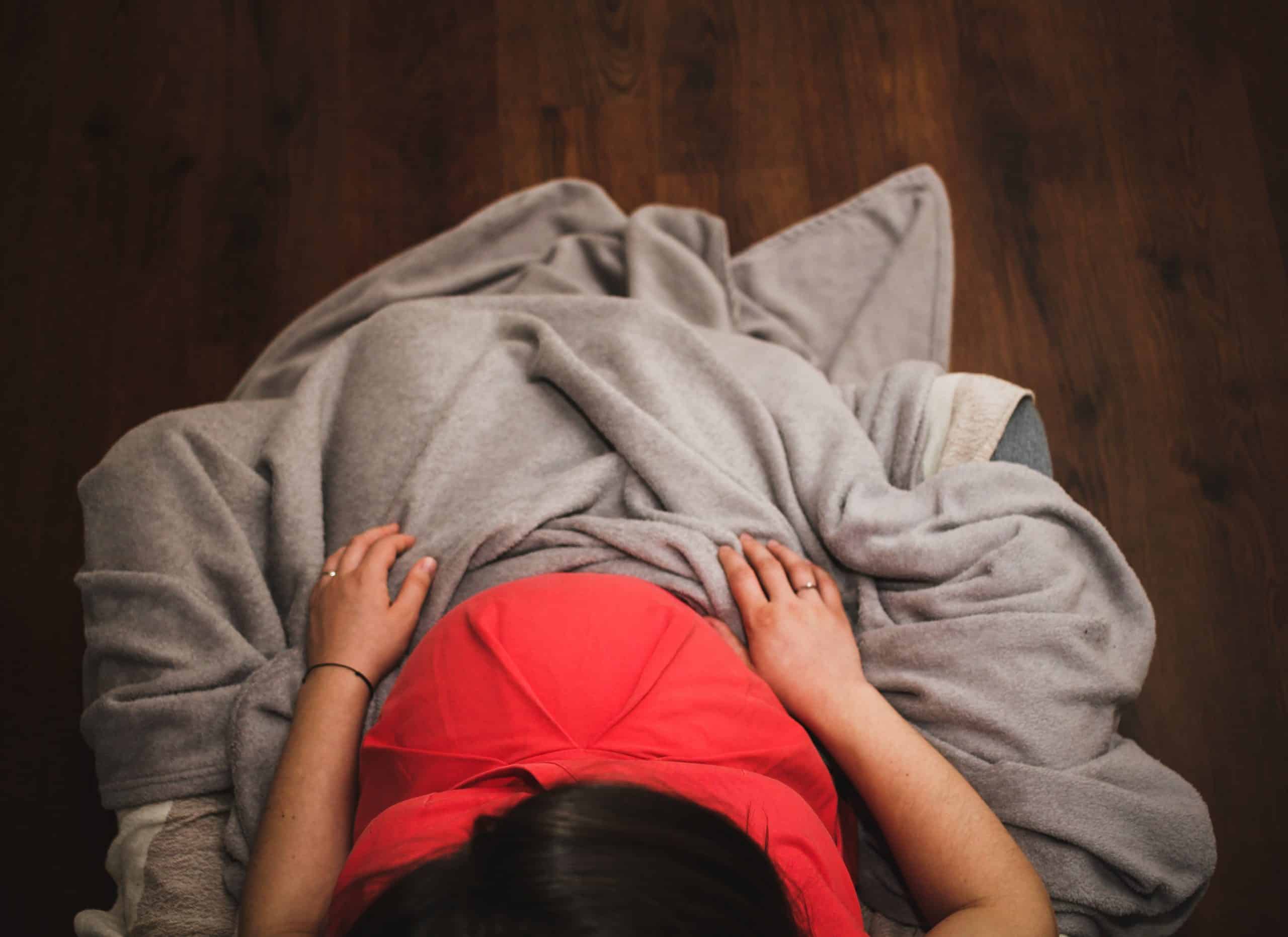When I was nearing the end of my pregnancy, I obsessed over every twinge of pain, trying to determine if I’d had my first contraction. I wondered constantly: What do contractions feel like? What will labor be like? I also experienced what I can only describe as pregnancy-induced rage when women would say with a knowing smile, “Oh, you’ll just know,” when I asked what real contractions feel like. Instead, I was left to anxiously pore over pregnancy message boards reading other women’s experiences of going into labor. The night before I had my first contraction, we’d headed to the hospital because I thought I was leaking amniotic fluid. I wasn’t, but the triage nurse told me I was probably in the initial stages of labor. So, when I felt that first contraction, I suspected my labor had started, although I wasn’t sure, because I didn’t know exactly what to expect. And I was scared out of my maternity panties.  All that stuff they teach you in childbirth class? Right out the window. Until I realized, Hey, my body was made to do this. And in that moment, as my husband frantically ran around our house throwing stuff in a bag like a first-time dad on TV, I remained pretty calm. Because here’s the deal: A baby is going to come out of you one way or another. But giving birth isn’t and shouldn’t be a scary experience! There’s no need to be nervous about giving birth. We’re going to tell you exactly what contractions feel like, how to manage your contractions through labor, and answer all your contraction questions. Here’s everything you never knew you needed to know about what contractions feel like.
All that stuff they teach you in childbirth class? Right out the window. Until I realized, Hey, my body was made to do this. And in that moment, as my husband frantically ran around our house throwing stuff in a bag like a first-time dad on TV, I remained pretty calm. Because here’s the deal: A baby is going to come out of you one way or another. But giving birth isn’t and shouldn’t be a scary experience! There’s no need to be nervous about giving birth. We’re going to tell you exactly what contractions feel like, how to manage your contractions through labor, and answer all your contraction questions. Here’s everything you never knew you needed to know about what contractions feel like. 
So what are contractions, anyway?
Short answer: Contractions are your body’s way of gearing up for labor. But what if I told you there are actually two types of contractions? In addition to those contractions—the ones that kickstart your labor—there are Braxton Hicks contractions, also known as false labor contractions. And what do Braxton Hicks contractions feel like? Those are more of a tightening in your abdomen, but you’ll know they’re not real, we’re-about-to-have-a-baby contractions because they’re sporadic, painless, and will usually stop if you rest or drink a glass of water.  So how the heck are you supposed to know the difference? “Braxton Hicks are contractions as well, just not powerful enough to cause cervical change,” says Heather Bartos, an OB-GYN at Be. Women’s Health and Wellness Center near Denton, Texas. “Labor starts when there are persistent contractions and cervical change.”
So how the heck are you supposed to know the difference? “Braxton Hicks are contractions as well, just not powerful enough to cause cervical change,” says Heather Bartos, an OB-GYN at Be. Women’s Health and Wellness Center near Denton, Texas. “Labor starts when there are persistent contractions and cervical change.”
What do contractions feel like?
You asked, and oh, baby, did we answer. While contractions do usually signal the beginning of labor, how they feel can vary wildly from woman to woman. “Imagine the worst menstrual cramp you’ve ever had,” says Bartos. ”Now imagine that all of the sudden you want to punch your partner in the face because it hurts so bad, like you’re trying to pass a huge bowel movement. But you physically can’t get to them to punch them because it hurts too bad every three minutes or so. It almost brings you to your knees and takes your breath away.” And that, ladies, is what contractions feel like. Sounds great, right?  We also spoke to real moms and asked the question What do contractions feel like? Ali Garrett, a veteran mom who’s given birth twice, says, “With my second baby, I had textbook contractions. When my contractions began, it felt like my belly was shrinking; a tightening if you will. It didn’t hurt, but it got my attention.” Garrett had experienced Braxton Hicks throughout her pregnancy, but these contractions were the real deal. “These contractions would last about 30 seconds, as opposed to Braxton Hicks, which would last about 10 seconds, but didn’t increase in pain or pressure.” New mom Dora Smith-Cook says, “For me, contractions came on suddenly. They felt like a very intense version of menstrual cramps. Lots of pressure and tightening in my lower abdomen. It was a dull but powerful pain, almost like a vibration that shook my whole lower body.” I gave birth six months ago, and my early contractions also felt like intense period cramping. Early on, I definitely felt the ebb and flow of a contraction like doctors describe. But closer to delivery, contractions came so fast I didn’t even have time to breathe through them.
We also spoke to real moms and asked the question What do contractions feel like? Ali Garrett, a veteran mom who’s given birth twice, says, “With my second baby, I had textbook contractions. When my contractions began, it felt like my belly was shrinking; a tightening if you will. It didn’t hurt, but it got my attention.” Garrett had experienced Braxton Hicks throughout her pregnancy, but these contractions were the real deal. “These contractions would last about 30 seconds, as opposed to Braxton Hicks, which would last about 10 seconds, but didn’t increase in pain or pressure.” New mom Dora Smith-Cook says, “For me, contractions came on suddenly. They felt like a very intense version of menstrual cramps. Lots of pressure and tightening in my lower abdomen. It was a dull but powerful pain, almost like a vibration that shook my whole lower body.” I gave birth six months ago, and my early contractions also felt like intense period cramping. Early on, I definitely felt the ebb and flow of a contraction like doctors describe. But closer to delivery, contractions came so fast I didn’t even have time to breathe through them.
Great, now I know what contractions feel like, but when will they start?
Now, I’m not saying your friend’s sister’s niece who had zero contractions during her labor is telling a fib, but…she’s probably not telling the truth either. “99.9 percent of women will feel contractions,” says Bartos. “And they are painful. I don’t know who that 0.01 percent woman is but I’d like to meet her!”  While Bartos says that most women will begin having intermittent labor contractions as early as 37 weeks, sometimes contractions aren’t felt until well into active labor. Amanda Johnson, who gave birth to her son about four weeks before her due date, says, “My water broke first, and I didn’t even realize that I was having contractions until the nurses hooked me up to the monitor. For me, strong contractions didn’t begin until I was almost ready to push.” When your water breaks, sometimes it will sort of feel like a hot water balloon has burst…inside you. But your bag of waters doesn’t always come out in a gush. Sometimes it’s like a trickle and can feel exactly like you’re peeing yourself (a sensation most pregnant women are already very familiar with). Whether it comes out in a trickle or a gush, you can expect labor to begin within 12 to 24 hours if your water breaks, so get thee to the hospital pronto.
While Bartos says that most women will begin having intermittent labor contractions as early as 37 weeks, sometimes contractions aren’t felt until well into active labor. Amanda Johnson, who gave birth to her son about four weeks before her due date, says, “My water broke first, and I didn’t even realize that I was having contractions until the nurses hooked me up to the monitor. For me, strong contractions didn’t begin until I was almost ready to push.” When your water breaks, sometimes it will sort of feel like a hot water balloon has burst…inside you. But your bag of waters doesn’t always come out in a gush. Sometimes it’s like a trickle and can feel exactly like you’re peeing yourself (a sensation most pregnant women are already very familiar with). Whether it comes out in a trickle or a gush, you can expect labor to begin within 12 to 24 hours if your water breaks, so get thee to the hospital pronto.
Contractions are happening! When should I head to the hospital?
Most doctors recommend following the 4-1-1 rule, which does not mean dialing information for the name of the pizza place down the street. If your contractions are consistently four minutes apart, lasting about one minute each time, for about an hour, you should probably give your doctor a call and let them know you’re heading to the hospital. If you want to labor at home longer, your doctor may okay it, but Bartos says it’s time to head to the hospital when the contractions feel like they are too much to bear, or if you start shivering or shaking a lot. These could be signs that you’re in transition, which means you’re dilated to around 7 centimeters.  Of course, it would be too easy if everyone had a textbook labor and delivery. “With my first baby, I had no warning signs I was in labor until my water broke,” says Garrett. “Then contractions came quickly and painfully, without any warning.” For most first time moms, it can be hours before your contractions reach the 4-1-1 mark consistently, and sometimes labor can stall altogether if contractions don’t continue to build. “[My contractions] got closer together after a few hours, and occasionally I would have two back to back,” says Smith-Cook. “The level of intensity never really increased, which may have something to do with why I ended up with a c-section. I think if I had been able to deliver vaginally, they would have progressed to a stronger level.”
Of course, it would be too easy if everyone had a textbook labor and delivery. “With my first baby, I had no warning signs I was in labor until my water broke,” says Garrett. “Then contractions came quickly and painfully, without any warning.” For most first time moms, it can be hours before your contractions reach the 4-1-1 mark consistently, and sometimes labor can stall altogether if contractions don’t continue to build. “[My contractions] got closer together after a few hours, and occasionally I would have two back to back,” says Smith-Cook. “The level of intensity never really increased, which may have something to do with why I ended up with a c-section. I think if I had been able to deliver vaginally, they would have progressed to a stronger level.”
I heard sometimes you’re given medication to start contractions. Why is that?
Sometimes a doctor decides to administer Pitocin, a common medication given to jumpstart labor, especially if your water has broken but contractions haven’t started yet. Pitocin is actually a big dose of oxytocin, the same hormone your body produces naturally to stimulate contractions.  Because it’s a much larger amount of oxytocin designed to stimulate labor, Pitocin contractions can be incredibly intense, and it may be difficult to labor through them without an epidural. “I was given Pitocin after 24 hours with my first delivery,” says Garrett. “It was like getting struck by lightning; no peak or trough like they teach you in childbirth class, just blinding pain.”
Because it’s a much larger amount of oxytocin designed to stimulate labor, Pitocin contractions can be incredibly intense, and it may be difficult to labor through them without an epidural. “I was given Pitocin after 24 hours with my first delivery,” says Garrett. “It was like getting struck by lightning; no peak or trough like they teach you in childbirth class, just blinding pain.”
What do contractions feel like during labor?
During labor, your contractions will get progressively more intense, until it’s hard to breathe through them. It’s at that point that you may decide to get an epidural. “An epidural doesn’t take away the sensation of pressure,” says Bartos. “But the physical pain of contractions are significantly reduced.” Epidurals can be especially helpful if you’re experiencing back labor, which is often felt when the baby’s head is pressing against your tailbone due to its position in the womb. Epidurals sound kind of scary, but the relief they provide can help you catch a break during labor and replenish your energy for pushing.  Aubree Dickerson, a first-time mom who gave birth in January, says, “My contractions felt like intense period cramps. It was hard to take a deep breath through them, so I could only take short small breaths. Then I got an epidural and felt nothing. Praise God for that!” If you want to try to manage the pain of contractions naturally, you can try a ton of different pain management techniques, like good old-fashioned breathing exercises or even hypnotism. For natural relief of back labor pain, you can try having your partner press firmly against the small of your back each time your experience a contraction. The pressure of their hand counters the weight of the baby’s head, relieving some of the pressure and pain. So is one pain management technique better than another? “It depends on the woman,” says Bartos. “Some women really prepare (hypnotherapy, classwork prepping) and do well with more natural techniques, but some women fear those modalities and request anesthesia. Either is a fine choice!”
Aubree Dickerson, a first-time mom who gave birth in January, says, “My contractions felt like intense period cramps. It was hard to take a deep breath through them, so I could only take short small breaths. Then I got an epidural and felt nothing. Praise God for that!” If you want to try to manage the pain of contractions naturally, you can try a ton of different pain management techniques, like good old-fashioned breathing exercises or even hypnotism. For natural relief of back labor pain, you can try having your partner press firmly against the small of your back each time your experience a contraction. The pressure of their hand counters the weight of the baby’s head, relieving some of the pressure and pain. So is one pain management technique better than another? “It depends on the woman,” says Bartos. “Some women really prepare (hypnotherapy, classwork prepping) and do well with more natural techniques, but some women fear those modalities and request anesthesia. Either is a fine choice!”
My doctor says I have plenty of time after contractions start before delivery, but I’m worried about giving birth in the car!
“Once my contractions with my [linkbuilder id=”6718″ text=”second child”] were 10 minutes apart, we went ahead to the hospital, where my water broke five hours later and active labor began,” says Garrett. “Twelve hours later, we had a baby.” Generally, first-time moms do tend to have a longer labor. Most of the time, active labor for first-time moms lasts between eight and 12 hours. But sometimes labor can progress quickly, even for first-time moms.  Take my son’s birth, for example. I had intermittent contractions the night before I gave birth, and the next morning, I sent my husband off to work with the promise that I’d call if I felt anything. An hour later, I was trying to tell him to get home between contractions. About four hours later, our son was born. My contractions came hard and fast, and I felt the need to push within just a few minutes of arriving at the hospital. The nurses had to scramble to set up our room for delivery because they assumed I’d be in labor for hours! The best thing to do? Head to the hospital whenever you feel like you need to. You’ll get checked out and sent back home if your doctor decides you’re not in active labor. A few false alarms are totally worth avoiding an impromptu home birth.
Take my son’s birth, for example. I had intermittent contractions the night before I gave birth, and the next morning, I sent my husband off to work with the promise that I’d call if I felt anything. An hour later, I was trying to tell him to get home between contractions. About four hours later, our son was born. My contractions came hard and fast, and I felt the need to push within just a few minutes of arriving at the hospital. The nurses had to scramble to set up our room for delivery because they assumed I’d be in labor for hours! The best thing to do? Head to the hospital whenever you feel like you need to. You’ll get checked out and sent back home if your doctor decides you’re not in active labor. A few false alarms are totally worth avoiding an impromptu home birth.
Is it true I’ll have contractions after delivery too?
Ah, you sweet little starfish. No one told you that contractions don’t end immediately upon giving birth? It’s true. They don’t. But, there’s a silver lining! Actually, there are two silver linings. The first? You have your baby!  The second? After-labor contractions are nowhere near as painful as the ones felt during labor. Generally, you’ll feel contractions as you deliver the placenta. “Your uterus was up by your rib cage and it rapidly shrinks down to your belly button—that requires muscle contraction … These are essential for your uterus to return to normal—if this doesn’t happen, a woman can experience significant postpartum bleeding and hemorrhage,” says Bartos. You may also continue to feel mild contractions for several weeks, particularly when you breastfeed, as your uterus continues to shrink back to its normal size. These contractions feel like manageable period cramps.
The second? After-labor contractions are nowhere near as painful as the ones felt during labor. Generally, you’ll feel contractions as you deliver the placenta. “Your uterus was up by your rib cage and it rapidly shrinks down to your belly button—that requires muscle contraction … These are essential for your uterus to return to normal—if this doesn’t happen, a woman can experience significant postpartum bleeding and hemorrhage,” says Bartos. You may also continue to feel mild contractions for several weeks, particularly when you breastfeed, as your uterus continues to shrink back to its normal size. These contractions feel like manageable period cramps.
Now that I know what contractions feel like, I don’t exactly feel better about giving birth.
So here’s the deal: Giving birth hurts like a mother. But it really is manageable. I promise. Now that you know what contractions feel like, you can use this information to reframe your mindset about labor pain. “Embracing the idea that childbirth is painful (for a short period of time only, thank goodness!) can actually help your brain prepare for such an event,” says Bartos. And you know what, mama? You’re gonna do great.



